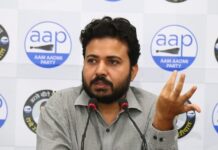
New Delhi, India on Friday announced that it will contribute Rs 4,500 crore to Bhutan’s 12th Five-Year Plan following delegation-level talks headed by Prime Minister Narendra Modi and his Bhutanese counterpart Lotay Tshering here as the two sides also reviewed the progress of various hydro-power projects in the Himalayan kingdom.
“I have assured the Prime Minister that India will continue to play the role of a trusted friend and partner in Bhutan’s development,” Modi said in a joint address to the media with Tshering following the meeting.
“India will make a contribution of Rs 4,500 crore for Bhutan’s 12th Five-Year Plan,” he said.
“This contribution will be made according to Bhutan’s needs and priorities.”
Bhutan’s 12th Five-Year Plan runs from 2018 to 2023.
Stating that Tshering described his “Narrowing the Gap” vision in detail during their, Modi said that this matched his “Sabka Saath, Sabka Vikas” (Collective Efforts, Inclusive Growth) vision.
He said that development of hydro-power projects is an important part of the long history of India’s aid to Bhutan.
“Today we reviewed our aid for all related projects in this important sector,” Modi said.
Stating that that work on the 720-MW Mangdechhu hydro-power project in Bhutan will be completed soon, he said that both sides have also agreed on the electricity tariff rates from this project.
India is a leading development aid partner for Bhutan. There are a number of institutional mechanisms between India and Bhutan in areas like security, border management, trade, economy, hydroelectricity, development cooperation and water resources.
New Delhi has already set up three hydro-power projects in Bhutan with a total capacity of 1,416 MW, which are operational. About three-fourth of the power generated is exported to India and the rest is used for domestic consumption.
“Work on other (hydro-power) projects are also progressing satisfactorily,” Modi said, adding that both sides sought to add momentum to all such projects.
Stating that space science is a new area of cooperation between the two countries, he said that a ground station will be soon be developed in Bhutan by the Indian Space Research Organisation (ISRO) to reap the benefits of the South Asian Satellite.
“Once completed, this will help in weather information, tele-medicine and disaster relief work in remote areas of Bhutan,” he stated.
Expressing his gratitude at Bhutan’s decision to introduce the India-launched RuPay cards soon, the Indian Prime Minister said that this will greatly boost people-to-people ties between the two countries.
On his part, Tshering said that the main aim of his visit, taking place on the golden-jubilee year of India-Bhutan diplomatic ties, is to take the bilateral relationship to much greater heights.
“We are very happy that Prime Minister Modi is personally committed to be with us, to support us and in that light we all heard that the government of India has again extended full support for our 12th Five-Year Plan,” he said.
He said that this will also help traders in Bhutan who have been affected by the Goods and Services Tax (GST) that has been introduced in India.
Pointing out that hydro-power is the main source of revenue for Bhutan, Tshering appreciated India’s support during the negotiations for tariff of the Mangdechhu project and expressed the hope that work on the 2,560-MW Sunkosh project will start soon.
He also invited Modi to visit Bhutan and inaugurate the Mangdechhu project that will be completed in a few months.
Earlier in the day, Tshering was accorded a ceremonial welcome at the Rashtrapati Bhavan here.
External Affairs Minister Sushma Swaraj also called on the visiting dignitary.
Tshering arrived here on Friday on a three-day visit to India, his first official trip abroad after assuming office in October.
Tshering’s Druk Nyamrup Tshogpa (DNT) party, formed in 2013, won 30 of the 47 National Assembly seats in the elections in the Himalayan kingdom held in October.
The country of 800,000 people, located between India and China, has chosen a different party to rule at each election since the end of absolute monarchy in 2008.








